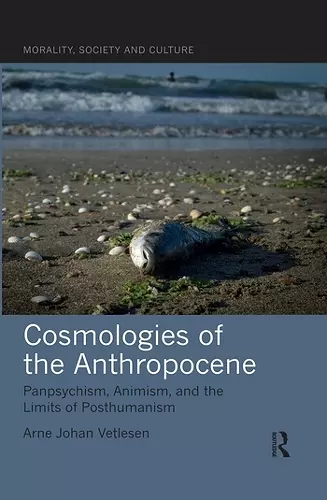Cosmologies of the Anthropocene
Panpsychism, Animism, and the Limits of Posthumanism
Format:Paperback
Publisher:Taylor & Francis Ltd
Published:31st Jul '20
Currently unavailable, and unfortunately no date known when it will be back
This paperback is available in another edition too:
- Hardback£120.00(9780367182922)

Cosmologies of the Anthropocene delves into the misconceptions surrounding nature in Western thought since the advent of modern philosophy. It examines the profound consequences of these misunderstandings, particularly in the context of the Anthropocene. By integrating insights from recent anthropological research, the author presents a radical alternative cosmology that reinterprets the relationship between mind and matter, aiming to challenge contemporary posthumanist critiques.
The book engages with the enduring philosophical debate about the nature of mind and matter, highlighting how the significance of this discussion has evolved in the Anthropocene era. The author argues that since the time of Descartes, our understanding of matter and the natural world has been fundamentally flawed, leading to detrimental outcomes in practice. To address these issues, the text explores various philosophical alternatives proposed by thinkers like Whitehead and Nagel, as well as posthumanist perspectives from figures such as Barad and Latour.
Central to the author's argument is the concept of animism as a form of panpsychism, which offers a transformative view of the interconnectedness of culture and nature. This perspective is used to critique current posthumanist interpretations of the Anthropocene, revealing their philosophical shortcomings and lack of political and ethical engagement. Cosmologies of the Anthropocene provides a groundbreaking rethinking of our relationship with the natural world, making it a valuable resource for scholars in sociology, philosophy, social theory, and anthropology who are interested in exploring our connection to nature.
"How ought one do philosophy in a time defined by the human impact on earthly systems and ecologies? That is, what does the Anthropocene require of philosophers? Many believe that thinking closely about human existence demands thinking closely about the environmental devastation that seems to accompany that existence. For Vetlesen (Univ. of Oslo), the best way to address the anthropocentric excesses that give rise to environmental crises is to move from anthropocentrism (as a cosmological conception and moral vision) to panpsychism. Drawing on research in anthropology, Vetlesen argues that “animism is panpsychism in practice” (p. 15). He offers substantive engagement with Thomas Nagel, Alfred North Whitehead, and the “agential realism” of Karen Barad, providing a rigorously analytic treatment that appreciates the philosophical contributions of Continental thought. Whether or not one ultimately agrees with Vetlesen’s conclusions regarding the promise of panpsychism, this book is an important contribution to debates about devoting philosophical attention to a transformed, and sustainable, relationship between humans and others (whether human or not). This is a compelling but controversial text."
-J. A. Simmons, Furman University
ISBN: 9780367545345
Dimensions: unknown
Weight: 408g
270 pages